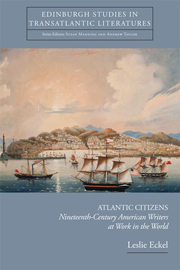Book contents
- Frontmatter
- Contents
- Acknowledgements
- Dedication
- Introduction: The Vocational Routes of American Literature
- 1 Longfellow and the Volume of the World
- 2 Fuller's Conversational Journalism: New York, London, Rome
- 3 ‘A type of his countrymen’: Douglass and Transatlantic Print Culture
- 4 Between Cosmos and Cosmopolis: Emerson's National Criticism
- 5 The Professional Pilgrim: Greenwood Sells the Transatlantic Experience
- 6 Standing Upon America: Whitman and the Profession of National Poetry
- Afterword: Vocation or Vacation? Transatlantic Professionalism Now
- Notes
- Bibliography
- Index
Introduction: The Vocational Routes of American Literature
Published online by Cambridge University Press: 05 September 2013
- Frontmatter
- Contents
- Acknowledgements
- Dedication
- Introduction: The Vocational Routes of American Literature
- 1 Longfellow and the Volume of the World
- 2 Fuller's Conversational Journalism: New York, London, Rome
- 3 ‘A type of his countrymen’: Douglass and Transatlantic Print Culture
- 4 Between Cosmos and Cosmopolis: Emerson's National Criticism
- 5 The Professional Pilgrim: Greenwood Sells the Transatlantic Experience
- 6 Standing Upon America: Whitman and the Profession of National Poetry
- Afterword: Vocation or Vacation? Transatlantic Professionalism Now
- Notes
- Bibliography
- Index
Summary
It should come as no surprise to those who know Walt Whitman that the poet chose to mark the United States centennial in 1876 by celebrating himself. As he prepared the ‘Centennial Edition’ of Leaves of Grass for distribution at home and abroad, he composed a ‘personal’ letter ‘To the Foreign Reader’ of his works. In this letter, which he intended to serve as a preface to the edition, Whitman planned to ‘enfold the world’ with his words and to bind its varied nations and peoples together with ‘new formulas, international poems’. His vision of a new world order of literary ‘Adhesiveness’, or emotional attachment, would stand on the shoulders of personal relationships rather than institutions of government. Whitman proposes:
To begin, therefore, though nor envoy, nor ambassador, nor with any official right, nor commission'd by the President – with only Poet's right, as general simple friend of Man – the right of the Singer, admitted, all ranks, all times – I will not repress the impulse I feel, (what is it, after all, only one man facing another man, and giving him his hand?) to proffer here, for fittest outset to this Book, to share with the English, the Irish, the Scottish and the Welsh, – to highest and to lowest, of These Islands – (and why not, launch'd hence, to the mainland, to the Germanic peoples – to France, Spain, Italy, Holland – to Austro-Hungary – to every Scandinavian, every Russ?) the sister's salutation of America from over Sea – the New World's Greeting-word to all, and younger brother's love.
- Type
- Chapter
- Information
- Atlantic CitizensNineteenth-Century American Writers at Work in the World, pp. 1 - 18Publisher: Edinburgh University PressPrint publication year: 2013



